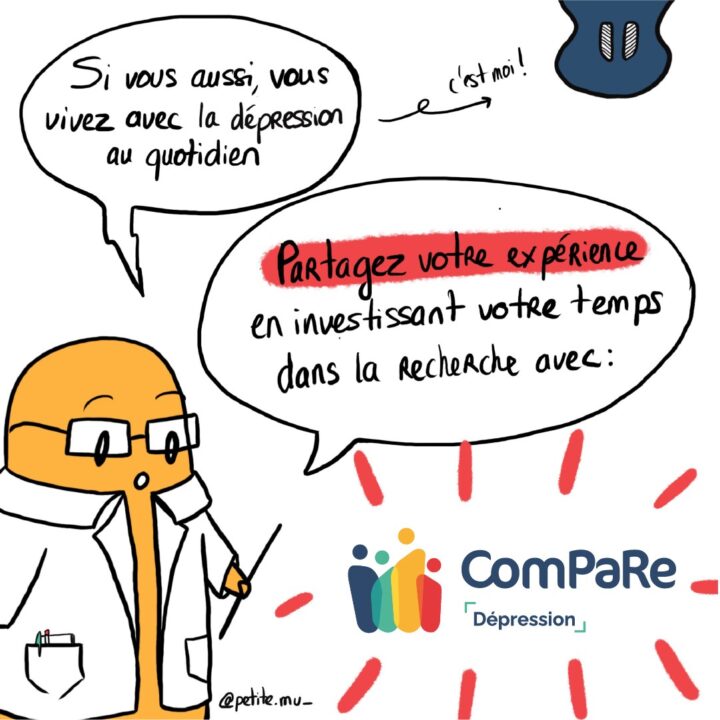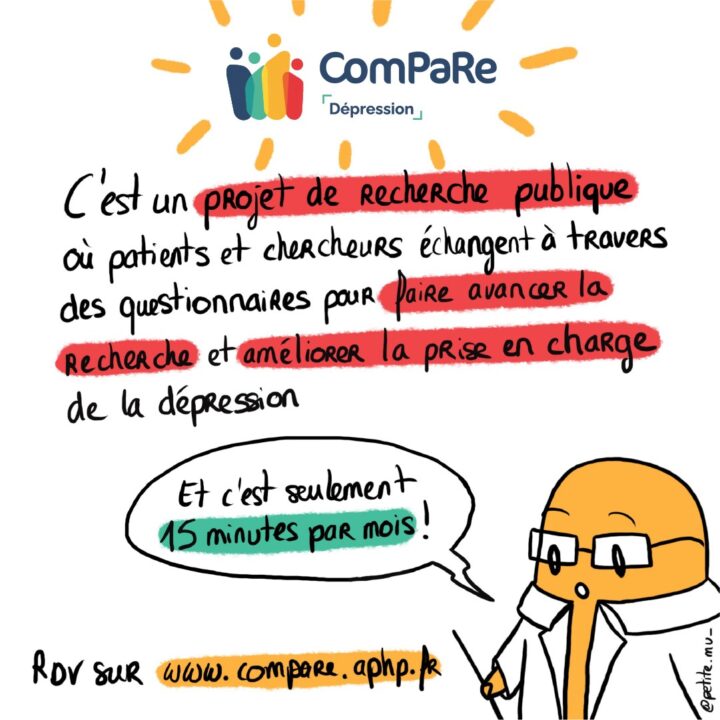Depending on the study, the worldwide prevalence of depression is estimated to be between 4% and 8%. The Global Burden of Disease ranks it as the 2nd leading cause of years lived with disability (YLD) worldwide and the 13th leading cause of disability.
Mental health disorders (including, above all others, depression), beyond their impact on individuals, generate a total cost of more than 600 billion euros in the 28 countries of the European Union (i.e., more than 4% of GDP). In France, this represents 3.7% of the country’s GDP.
Identified as a public health problem, the epidemiology of depression is documented by large Scandinavian population cohorts and by clinical cohorts such as NESDA in the Netherlands, which have recruited patients in primary and secondary care (2981 people in 2004 – around 2000 people in 2019).
ComPaRe Depression is an e-cohort that includes people who report as either having or having had depression. We have chosen to focus on people who identify with this diagnosis, regardless of whether it has been made by a psychiatrist, a general practitioner or by self-diagnosis. We are interested in all types of depression: single episode, persistent depression, depression in the context of bipolar disorder, post-partum depression, without excluding co-morbidities.
The objectives of ComPaRe Depression are to look at the trajectory of individuals, to identify relapse factors, to assess in detail the impact of depression on daily life, on professional and social life, and to study the perception of the disorders with the people concerned. To this end, we are collecting longitudinal health and socio-demographic variables, which are available in the online protocol.
As well as being an e-cohort, ComPaRe Depression is also a collaborative research platform open to any publicly-funded research project carried out by an academic institution. ComPaRe can be used to conduct a number of studies: cross-sectional or longitudinal observational studies, nested trials, qualitative studies, etc. For more information on how to use ComPaRe Depression as a researcher, click here.
Références :
- GBD 2019 Mental Disorders Collaborators. Global, regional, and national burden of 12 mental disorders in 204 countries and territories, 1990-2019: a systematic analysis for the Global Burden of Disease Study 2019. Lancet Psychiatry. 2022 Feb;9(2):137-150. doi: 10.1016/S2215-0366(21)00395-3. Epub 2022 Jan 10. PMID: 35026139; PMCID: PMC8776563.
- Herrman H, Patel V, Kieling C, Berk M, Buchweitz C, Cuijpers P, Furukawa TA, Kessler RC, Kohrt BA, Maj M, McGorry P, Reynolds CF 3rd, Weissman MM, Chibanda D, Dowrick C, Howard LM, Hoven CW, Knapp M, Mayberg HS, Penninx BWJH, Xiao S, Trivedi M, Uher R, Vijayakumar L, Wolpert M. Time for united action on depression: a Lancet-World Psychiatric Association Commission. Lancet. 2022 Mar 5;399(10328):957-1022. doi: 10.1016/S0140-6736(21)02141-3. Epub 2022 Feb 15. PMID: 35180424.
- Léon Christophe, du Roscoät Enguerrand, Beck François. Bulletin épidémiologique hebdomadaire, 2023, n°. 2, p. 28-40
https://www.nesda.nl/nesda-english/ - OECD/EU. Health at a Glance: Europe 2018: State of Health in the EU Cycle. 2018
Astrid Chevance – astrid.chevance@aphp.fr
https://compare.aphp.fr/
https://compare.aphp.fr/depression/


